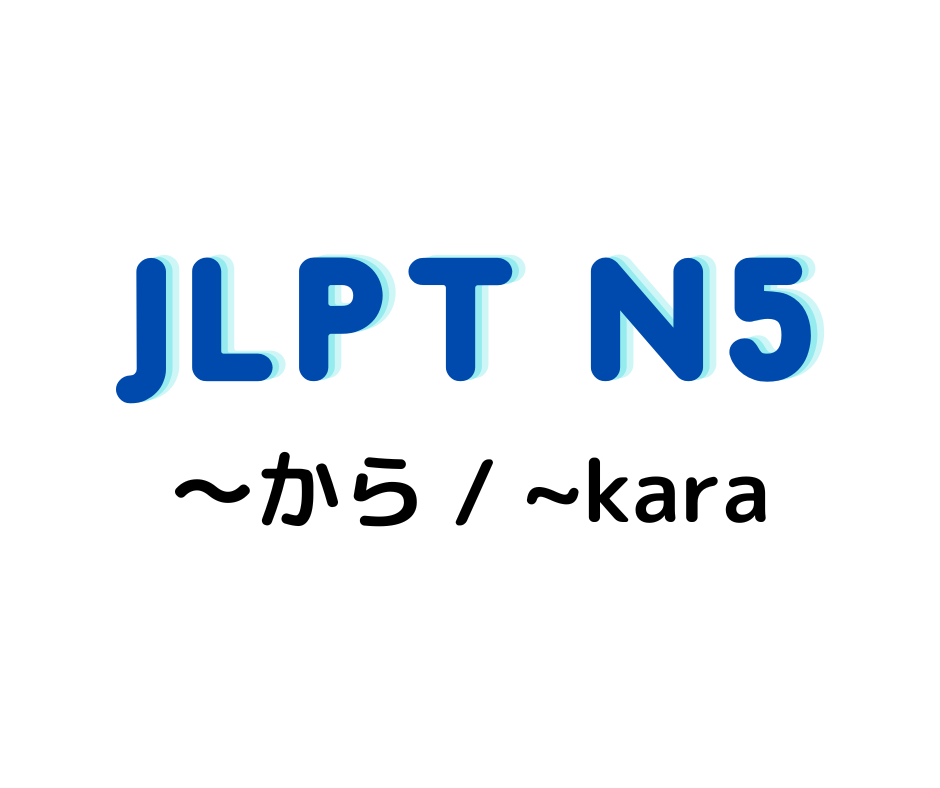sentence pattern: 〜から / ~kara
【Grammar Type】
Conjunction
【Essential Meaning】
Because / Since
【Construction】
Sentence 1 informal + kara, Sentence 2
- E.g. 眠いから、寝る。
- nemuikara,neru. [Because I’m sleepy, I will sleep.]
Sentence + kara + da
- E.g. 眠いからだ。
- nemui karada. [It’s because I’m sleepy.]
NOTE
- から (kara/ Reason / Cause) works similarly to the English subordinating conjunction “Because“. It is used to construct sentences such as “Because of X, Y” or “A: Why Y? B: Because X“. In other words, Sentence 1 indicates a reason or cause for the situation in Sentence 2. Note that the から clause always precedes the main clause.
- Because the から clause is a subordinate clause, its verb generally takes an informal form. But in very formal speech, it is acceptable to use a formal form.
- E.g. 今日は忙しいですから明日来てください。
- kyou wa isogasii desukara asita kitekudasai[Because I’m busy today, please come tomorrow.]
- E.g. 今日は忙しいですから明日来てください。
- The main clause (i.e. Sentence 2) may be omitted and replaced with the copula だ if its content is obvious or known to the hearer through context. One common situation when Sentence 2 may be dropped is when answering a “Why?” question, because it would be unnecessary and redundant to repeat the question back to the asker. The copula must match the formality level of Sentence 1.
- E.g. 来年日本へ行きますからだ。
- rainen nihon e ikimasu karada. [It’s because I’m going to Japan next year.]
- This sentence is ungrammatical, because the verb 行いきます(ikimasu) is in a formal form, and the copula だ is in an informal form.
- E.g. 来年日本へ行くからだ。
- rainen nihon e ikukarada. [It’s because I’m going to Japan next year.]
- This sentence is OK because 行く(iku) is informal and だ is informal.
- E.g. 来年日本へ行きますからだ。
- In question-answer situations, the expression may be further abbreviated by dropping the copula altogether.
- E.g. 来年日本へ行きますから。
- rainen nihon e ikimasukara. [Because I’m going to Japan next year.]
- E.g. 頭が痛かったから。
- atama ga itakatta kara.[Because my head hurt.]
- E.g. 来年日本へ行きますから。
- In very formal situations or when formally explaining matters of fact, you can say からです(karadesu) instead of ですから(desukara). But in regular conversation, ですから can come across as overly proper or even condescending. It’s kind of like saying “Duh” or “You might not know, but let me tell you…“; it basically assumes that the hearer is ignorant of the topic.
- E.g. 日本が大好きだからです。
- nihon ga daisuki dakara desu. [I quite enjoy Japan.] This example is not ungrammatical, but it sounds overly prim and proper due to からです.
- E.g. この人は暗殺されました。嫌われていたからです。
- nihon hito wa ansatsu saremasita. kirawareteita karadesu. [This person was assassinated. It’s because he was disliked.]
- It is acceptable to use からです(karadesu) in this case because the speaker is merely relaying a fact. Facts don’t necessarily require a soft, conversational tone.
- E.g. 休日ですから。
- kyuujitsu desukara[Because it’s a holiday.]
- This example sounds normal and conversational.
- E.g. 休日だからです。
- kyuujitsu dakaradesu. [You may not know this, but it’s because it’s a holiday.]
- This example is a bit offensive because the speaker is assuming that the hearer doesn’t know it’s a holiday and is condescendingly explaining this fact to the hearer.
- E.g. 田中くんはモテるですね。かっこいですから。
- tanaka kun wa moteru desune. kakkoiidesukara. [Tanaka-kun is popular, isn’t he? It’s because he’s cool.]
- This example sounds natural.
- E.g. 田中くんはモテるですね。かっこいからです。
- tanaka kun wa moteru desune. kakkoii karadesu. [Tanaka-kun is popular, isn’t he? You may not know this, but it’s because he’s cool.]
- This comes across as condescending due to からです(karadesu).
- E.g. 日本が大好きだからです。
Example Sentences
- 今日は息子の誕生日ですから、早く帰ります。
- kyou wa musuko no tanjyoubi desukara, hayaku kaerimasu.
- Today is my son’s birthday, so I will go home early.
- 日本の会社で働きたいですから、日本語を勉強しています。
- nihon no kaisya de hatarakitai desukara, nihongo wo benkyou siteimasu.
- I want to work in a Japanese company, so I am studying Japanese.
- 明日はテストがあるから、遊べません。
- asita wa tesuto ga arukara, asobemasen.
- I have a test tomorrow, so I can’t play.
- コーヒーを飲んだから、今は全然眠くないです。
- ko-hi- wo nondakara, ima wa zenzen nemukunaidesu.
- I drank some coffee, so I’m not sleepy at all.
- 昨日、彼女のプレゼントを買ったから、もうお金がありません。
- asita, kanojo no purezento wo kattakara, mou okanega arimasen.
- I bought a present for my girlfriend yesterday, so I don’t have any more money.
- この問題は難しいですから、私にはわかりません。
- kono mondai wa muzukasii desukara, watasi niwa wakarimasen.
- I don’t understand this question because it’s difficult.
- 牛乳がありませんから、コンビニへ買いに行きます。
- gyuunyuu ga arimasenkara, konbini e kaini ikimasu.
- I don’t have any milk, so I’m going to the convenience store to buy some.
- 野菜が嫌いですから、食べたくないです。
- yasai ga kirai desukara, tabetakunaidesu.
- I don’t like vegetables, so I don’t want to eat them.
- 映画が好きですから、よくパソコンで見ています。
- eiga ga sukidesukara, yoku pasokon de miteimasu.
- I like movies, so I often watch them on my computer.
- この本、面白いから、ぜひ読んでみて。
- kono hon, omosiroikara, zehi yondemite.
- This book is interesting, so please read it.



コメント